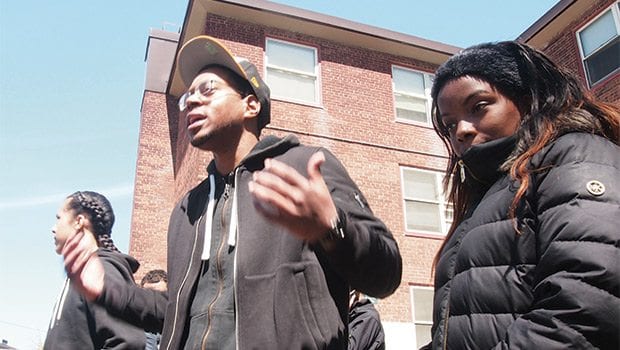BHA, HUD providing second chance for local youths
Officials launch new program, youths cite police harassment

Back in 1996, as public housing developments struggled with crime, Congress passed the so-called “one strike” law, mandating eviction of criminally-involved tenants.
Now, as the pendulum of public opinion swings from punishment to rehabilitation, the federal Department of Housing and Urban Development has instituted a new program to help ex-offenders clear their records so that they can obtain jobs and housing.
Last week officials from HUD and the Boston Housing Authority joined Mayor Martin Walsh at the Lenox/Camden public housing development to announce a $100,000 grant to assist ex-offenders. The grant, to be managed by the BHA and Greater Boston Legal Services, will help people between the ages of 16 and 24 who live in BHA housing, or would be eligible for BHA housing without a CORI, to seal their records.
“Mistakes that young people make should not be a life sentence,” said BHA Administrator Bill McGonagle. “This is an important step in the right direction.”
The funding comes through HUD’s Juvenile Reentry Assistance Program, a $1.75 million national effort aimed at fostering partnerships between housing authorities and legal aid groups to help seal records. The BHA’s partnership with GBLS is a game-changer, according to Pauline Quiron, who directs the nonprofit’s CORI and Reentry Project. GBLS often represents people who are being evicted from BHA properties.
“It’s new for us,” Quiron said of the partnership. “It’s fabulous that we’re joining forces. We’ve struggled to find funding for our CORI project. We are putting attorneys to work on this. We can make a difference.”
In addition to sealing records, the project will also connect participants with the job training programs, including BHA’s Jobs Plus program, literacy programs and other resources.
“Providing a vehicle for a second chance for our young people is very important to me as the mayor of Boston,” Walsh said. “This grant is another example of our commitment to provide opportunity and access to all in our city.”
Complaints of harassment
The setting for the announcement, in the Lenox Street housing development, underscored the criminal justice challenges facing public housing residents and the city officials who administer them. Last month a police sweep of the development netted 19 arrests on gun and drug charges. While the arrests were aimed at targeting gang activity in a tough corner of Lower Roxbury, not everyone is happy with the increased police presence in the development.
Surrounded by a phalanx of teens, local activist Mwase Potts approached Walsh after the press conference, asking that he stop police from harassing youth in the development.
“They’re out here every day,” he said. “When we’re in the park or in public areas, they tell us we can’t be here.”
While the Boston Housing Authority Police patrol the area, Potts, who is 25, said he and other young black men are targeted primarily by the Boston Police Department’s Gang Unit. He says that by forcing him and other youths to leave parks, sidewalks and other places of public accommodation, the police are violating his rights.
“They’re always jumping out of their cars with their guns and their vests telling kids they’ve got to go out of their own neighborhood,” Potts said. “I understand that the neighborhood needs to be protected, but they have to treat people like human beings.”
Potts said that whites who frequent the area are allowed to walk the sidewalks and congregate in the parks unimpeded by the police, but that he and his friends are harassed even when not in public spaces.
“We were in a pizza shop — Pizza Italian,” he said, referring to a Shawmut Avenue pizzeria. “They came in and told us to leave while we were waiting for our food. The people who owned the shop were yelling at them to leave us alone. They made us leave.”


![Banner [Virtual] Art Gallery](https://baystatebanner.com/wp-content/uploads/2024/04/Cagen-Luse_Men-at-store-e1713991226112-150x150.jpg)



